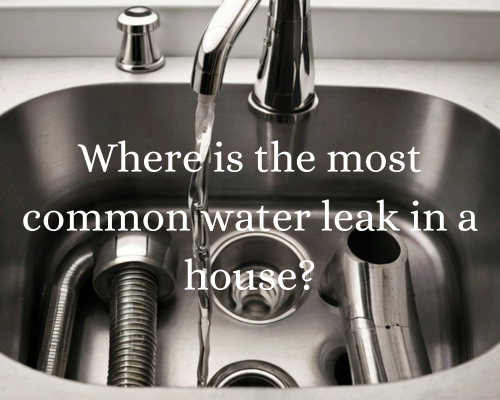Do you know where the most common water leak in a house is? Water leaks can be a nuisance. If left untreated, they can lead to significant damage and costly repairs.
Dean Owens of Plumbers Warragul highlights that “Identifying the source of a water leak can be challenging. But knowing where to look can make the process much easier.”
In this article, we will explore the most common areas in a house where water leaks occur.

One of the most common areas for a water leak in a house is the bathroom. Leaks can occur in the toilet, sink, shower, and bathtub.
A leaking toilet can waste a significant amount of water. It can be caused by a faulty flapper valve or a damaged seal. Meanwhile, a leaky sink or showerhead can also waste a lot of water. These may be caused by a worn-out washer or damaged seal.
Another common area for a water leak in a house is the kitchen. Leaks can occur in the sink, faucet, and dishwasher.
A leaking sink or faucet can be caused by a worn-out washer or damaged seal. Meanwhile, a leaking dishwasher can be caused by a damaged hose or a faulty seal.
It is essential to regularly check for leaks in the kitchen to prevent water damage and to conserve water.
Identifying Common Water Leak Locations
When it comes to identifying common water leak locations in your house, it can be a daunting task. However, with a little bit of knowledge and effort, you can easily identify the most common water leak locations and take necessary steps to fix them. Here are some of the most common water leak locations that you need to keep an eye on:
Bathroom Leaks
Bathroom leaks are one of the most common water leak locations in a house. Leaking taps, dripping faucets, and faulty plumbing fixtures are the most common culprits.
Toilets, sinks, tubs, and shower areas are the main areas where you need to check for leaks. Look for water stains, mould, buckled or peeling material, and any other signs of water damage.
Kitchen Leaks
The kitchen is another area where you need to check for water leaks. Leaking taps, faulty plumbing fixtures, and damaged pipes are the most common culprits.
Check under the sink, around the dishwasher, and behind the refrigerator for any signs of water damage. Make sure to check the mixer taps and the flex hose connecting the sink and the dishwasher.
Utility Area and Appliances
Utility areas such as laundry rooms and basements are also common areas for water leaks. Hot water systems, air conditioning units, and other appliances can sometimes leak, so make sure to check them for leaks.
Look for water stains, mould, and any other signs of water damage. Also, check the automatic solenoids, manual isolation valves, and exposed pipe work for any leaks.
Prevention and Maintenance
To prevent water leaks in your house, regular inspections and maintenance are crucial. By taking proactive steps, you can avoid costly repairs and protect your home from water damage. Here are some tips to help you prevent water leaks:
Regular Inspections
Regular inspections can help you identify potential leaks before they become a major problem. Here are some areas to inspect:
- Check under sinks, around faucets, and near dishwashers for any signs of leaks or water damage.
- Inspect the toilet for leaks by adding food coloring to the tank and waiting for 15 minutes. If the water in the bowl changes color, there may be a leak.
- Check the water meter regularly to monitor your water usage. If you notice a sudden increase in usage, it could be a sign of a leak.
- Inspect the shut-off valve for your main water supply. Make sure it is working properly and can be easily turned off in case of an emergency.
Professional Assessments
Professional assessments can help you identify hidden leaks and ensure that your plumbing system is in good condition. Here are some things to consider:
- Hire a professional plumber like Plumbers Warragul to inspect your plumbing system regularly. They can identify potential leaks and make any necessary repairs.
- Consider installing leak detectors near appliances that use water. These devices can alert you to leaks before they cause significant damage.
- Check your water pressure regularly. High water pressure can cause leaks and other plumbing problems.
- Monitor your water bill. If you notice a sudden increase in your bill, it could be a sign of a leak.
Following these tips can help you prevent water leaks in your house and avoid costly repairs. Regular maintenance and professional assessments are key to keeping your plumbing system in good condition and protecting your home from water damage.